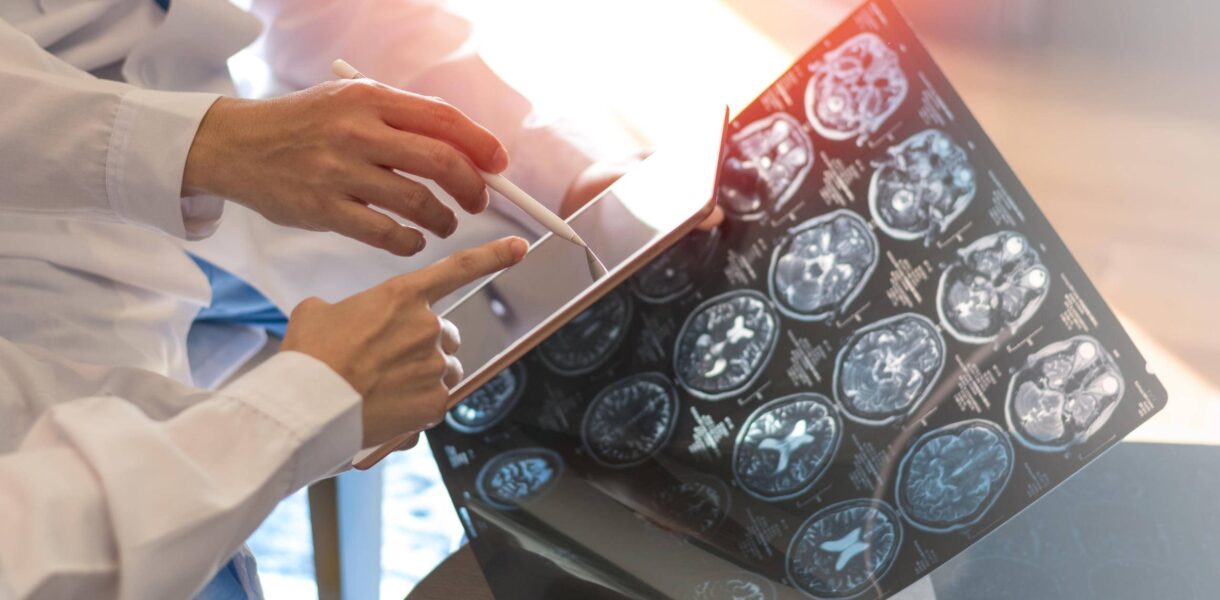
How is dementia diagnosed?
Dementia is not just a single disease. It’s an umbrella term for various medical conditions that include Alzheimer’s Disease, Lewy Body Dementia, Vascular Dementia, Frontotemporal Dementia, and other diseases like Parkinson’s and Huntington’s diseases. These conditions cause a decline in cognitive skills and increasingly affect a person’s abilities and behavior over time.
Dementia is not the only cause of memory problems. Depression, sleep apnea, delirium, medication side effects, thyroid problems, vitamin deficiency, or other conditions could be causing cognitive problems, and these conditions are usually treatable. When a person is undergoing medical testing, the medical team is not just looking for dementia; they’re looking for numerous other problems that cause memory loss.
Medical History
The first tool used to find the cause of dementia symptoms is a thorough medical history. The doctor takes detailed notes about past and current medical conditions, medications, and family history before moving on to a physical exam.
Physical Exam
This exam is a routine physical that includes a urinalysis and blood work. A physician will ask detailed questions about a patient’s symptoms: What changes in sleep, behavior, and memory are happening? When did they begin? How often do they happen? Have they intensified over time?
Because the physician will need a complete picture of a person’s symptoms, they may also ask a family member for input or observations.
Neurological Exam
If necessary, a primary care doctor will refer a patient to a neurologist, who will look for other conditions that impair memory, like a stroke, Parkinson’s disease, or brain tumors. Neurological tests check a person’s reflexes, muscle strength, speech, coordination, and nerve sensation.
Mental Cognitive Tests
At some point, a practitioner will administer one or two mental cognitive tests to evaluate a person’s executive function, judgment, attention, and language skills. Two popular tests are the mini-mental state exam (MMSE) and the mini-cog test, both of which require a patient to follow instructions, do simple calculations and remember three words.
Psychiatric Evaluation
In addition to assessing cognitive status, the doctor will evaluate a person’s sense of well-being and look for depression or other mood disorders that might be causing the memory problems or behavioral changes.
Brain imaging
If necessary, a person might undergo imaging technology like magnetic resonance imagining (MRI) or computed tomography (CT) to rule out tumors, stroke, severe head trauma, and fluid in the brain—all of which cause symptoms similar to Alzheimer’s.
If a patient is diagnosed with dementia, a doctor can also use brain imaging to determine what kind of dementia is present. For instance, if an individual has high levels of beta-amyloid, it suggests a diagnosis of Alzheimer’s. Brain imaging also helps doctors track the progression of an illness over time.
Watch the following video to get a more detailed look at dementia diagnosis.
https://www.youtube.com/watch?v=LieVEfI4luw&feature=emb_logo
Believe it or not, there are advantages to early detection. The earlier the diagnosis, the more options a patient has to manage their symptoms and possibly benefit from treatments and/or clinical drug trials. An early diagnosis also allows individuals more time to plan for their future—they can actively participate in decisions about care, financial and legal matters, and explore various assisted living options.
Avalon Memory Care welcomes inquiries from individuals diagnosed with dementia who would like to begin planning for their long-term assisted living needs in Houston, Arlington, and Dallas. Call (972) 713-1383 to request a tour of our beautiful, home-like memory care locations.
See More Articles
-
Visiting Your Aging Parent With Memory Loss at Avalon Memory Care
As a loving son or daughter, you naturally want the best of care for your senior parent. The compassionate assisted living caregivers at Avalon Memory Care want you to know that while your parent is living with us, he or she will receive nothing less than respectful, loving care within our comfortable, safe, and fully-staffed
-
Celebrating New Year’s Day in Memory Care
Families often find that celebrations with their loved ones in memory care are easier when they embrace new traditions. For instance, it may not be practical to expect your loved one to stay up until midnight on New Year’s Eve. Instead, consider throwing a New Year’s Day celebration, complete with a countdown to the first
-
Understanding Parkinson’s Disease and Dementia
Parkinson’s disease is an incurable neurological disorder, with progressively worsening complications. Perhaps the most well-known symptom of Parkinson’s is a hand tremor, but it can also cause speech changes, muscle rigidity, and impaired posture. Eventually, as the disease progresses, more than half of all individuals with Parkinson’s will require dementia care. This particular type of
Testimonials
Downloadable Resources
We Are Avalon
Discover the heart of our community; download ‘We Are Avalon’ to get to know our dedicated team and our commitment to providing a warm, family-like environment.
Transitional Care Guide
If you’re considering a transition, we’re here to help; download our Transitional Care Guide for compassionate guidance through each step of the process.
Schedule a Tour
Visit one of our 30+ campuses and experience our unique approach to memory care.












